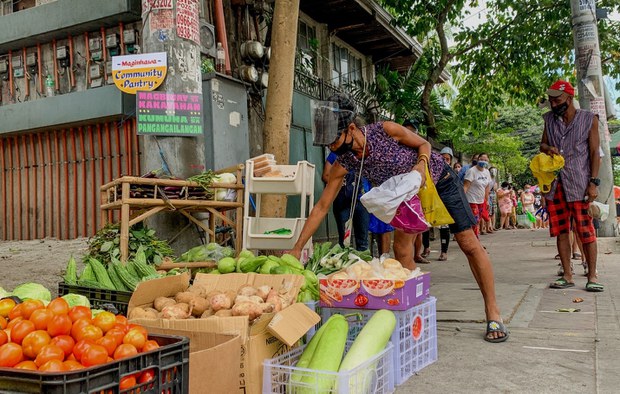
May 3, 2021, Hannah Dayan
Manila, Philippines
If the Philippines has community pantries, other countries have soup kitchens and food banks that have fed people during the COVID-19 crisis
People from all over the world have done what they can to address the ongoing pandemic. Some have doubled their efforts in feeding the poor through soup kitchens, while others have provided free assistance to isolated patients to help provide for their needs.
In the Philippines, the Maginhawa Street community pantry began operating on April 14, when 26-year-old Ana Patricia Non displayed her bamboo cart filled with basic necessities like canned goods, vegetables, vitamins, and face masks.
On top of the bamboo cart was a sign that read, “Magbigay ayon sa kakayahan, kumuha batay sa pangangailangan (Give what you can, take what you need).”
The Philippines was not alone in setting up community initiatives during the coronavirus pandemic. Several community programs sprang all around the globe, some even before the pandemic. These show how kindness, rather than hate, is innate in humans.
Here are some community projects in other countries during this pandemic:
Ravinda Birari’s free haircuts, India
With salons and barber shops closing down during the lockdown, Ravinda Birari started giving free haircuts to underprivileged children in a district in Mumbai, India.
Since June 2020, Birari catered to them once a week after having to close down his own salon in Bhandup due to COVID-19.
“It is more than two months of lockdown; all salons are closed. Poor children who live on the road cannot go anywhere to get their hair cut, so I am giving a free haircut to them,” Birari told ANI News.
One of the kids Birari gave a haircut to said, “Uncle is very good. Nobody has been coming here since the lockdown. However, he comes here and gives us a free haircut.”
Isolated assistance postcard, United Kingdom
In the United Kingdom, Becky Green in March 2020 created a PDF file of a postcard for isolated COVID-19 patients who were in need of assistance, such as getting groceries, posting mail, and getting urgent necessities.
Her husband, Jonny Green, posted Becky’s postcard on Twitter for others’ reference.
Providence Soup Kitchen, USA
Providence Soup Kitchen is run by the Daughters of Saint Mary of Providence to feed the less fortunate in Chicago. Although 30 years old, the kitchen braved through an unprecedented challenge when the coronavirus came.
When COVID-19 was declared a pandemic in March 2020, Providence’s distribution of meals dropped compared to pre-pandemic times. Due to the strain, less volunteers showed up at the soup kitchen due to fears of catching the coronavirus. They operated at a 10-person capacity weekly.
Volunteer coordinator Roberta Shepherd said, “Our volunteers on Mondays were in their nineties. On Wednesdays, their eighties. All those people went home. And then you had people who were just scared to death.”
Damien Copening was one of the people provided with meals by Providence. Due to COVID-19, Copening lost his job at a pizza place as it was forced to close, and he lost his apartment as he was unable to pay for it.
“Sometimes, you have to laugh to keep from banging your head against a wall,” Copening said. “It’s just insane with all the stuff that’s going on.”
The Food Bank, Singapore
Siblings Nichol and Nicholas Ng built Food Bank Singapore in January 2012 after working in a food distribution business. The siblings believed Singapore needed a food bank, which stepped up operations during the pandemic.
Now backed by several charities and organizations, the 9-year-old food bank aims to tackle food insecurity among Singaporeans who have little to no access to food. They also accept donations of excess produce from supermarkets, farms, and other producers to slowly address food waste.
Before COVID-19, Food Bank Singapore did not provide cooked meals to the less privileged. But in March 2020, the organization started distributing at least 2,000 meals per day. This later grew to 13,000 donated meals.
In an interview with The Global Food Banking Network, Nicholas Ng said, “We are only seeing the tip of the iceberg in terms of the real need on the ground. As most know, food is the litmus test to those who are really in need. If someone cannot feed themselves, it’s a reflection of the greater problem behind the real crisis.” – Rappler.com
Hannah Dayan is a Rappler intern. This article was done under the supervision of Rappler staff and her copy was vetted by editors.